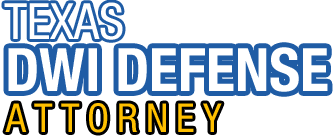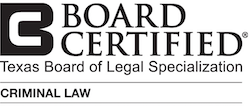Texas ALR Guideline
In Texas, when an individual is arrested for a charge of Driving While Intoxicated, the arresting officer typically confiscates their Texas Driver’s License and issues you a “Temporary Driving Permit” (DIC-25). However, an individual has the right to contest the suspension of your license. This process is called an Administrative License Revocation (or an "ALR" Hearing). You have 15 days from the date of “Notice Served” which most often is the date of your arrest.
On the temporary driving permit, there are two dates the officer should include. One includes the date of arrest, which is on the top portion of the DIC-25 form. The date of notice served will be on the bottom portion, above the officer’s information block. This is the date that you must use to calculate the 15-day deadline to request your Administrative License Revocation Hearing. If the hearing is not requested within the deadline, the defendant forfeits the right to the hearing, and the Temporary Driving Permit will expire on the 41st day after its issuance.
Implied Consent
Unfortunately, most people don’t realize when issued a Texas Driver’s License, that by signing the license, they’ve agreed to give a specimen of their breath and/or blood if requested to do so by a police officer. You do have the right to refuse these chemical tests, though. The Department of Public Safety has stiffer penalties for those who refuse the breath or blood test, which includes a 180-day license suspension on your first DWI arrest, and up to two years for any subsequent offenses.
State Office of Administrative Hearings ("SOAH")
The State Office of Administrative Hearings (SOAH) is a state agency which hears the Administrative License Revocation hearings. They are separate from the criminal courts that will preside over the actual DWI case. SOAH was created in 1991 by the Texas Legislature to be a neutral, independent forum to resolve legal disputes. The ALR hearing is held at the State Office of Administrative Hearings (SOAH) in a similar fashion as a hearing would be at the courthouse, which includes an Administrative Law Judge (sometimes referred to as an "ALJ"), acting as the Judge and the Jury, the defendant’s attorney, and the prosecutor from the Texas Department of Public Safety (DPS).
The Texas Department of Public Safety
The Texas Department of Public Safety (DPS) dedicates an entire division of their department to handle only ALR hearings. They staff DPS prosecutors to prosecute these License suspension hearings, Legal Secretary’s to assist the prosecutors, and clerks to perform other duties as required.
Requesting and Preparing for the Hearing
There are several necessary steps that need to be taken in orderto prepare for the hearing. However, the most integral of which is the very first thing that is required - which is invoking your right to contest the suspension by timely requesting a hearing within the requisite time period.
Requesting the Hearing
A defendant, or an attorney for the defendant, can request an "ALR" hearing to formally contest the suspension of the driver’s license by calling, faxing or mailing a written request to the Texas Department of Public Safety, Driver Improvement Bureau within the 15-day deadline. The request must include the defendant’s full name, date of birth, driver’s license number and the state that issued the driver’s license, current mailing address, a telephone number where the defendant (or defendant’s attorney) can be reached, date and county of arrest, arresting agency, arresting officer, and whether the officer requested a chemical test or if the defendant failed or refused said test.
The request for the Administrative License Revocation hearing must be received by DPS within the 15-day deadline. If the Department does not receive the request within this time period, it is presumed that the defendant wishes to waive their right to the hearing. If this occurs, once the Temporary Permit expires the defendant will then begin their driver’s license suspension. A timely and proper request for a hearing, however, should stay any suspension of the driver’s license, which effectively allows the defendant to continue driving until a final decision is reached by an Administrative Law Judge.
When and Where is the Hearing Held?
ALR hearings are conducted at some office or location of the State Office of Administrative Hearings. The main location for SOAH is in Austin, but there are satellite offices and branches throughout the State of Texas where these hearings are routinely held. Generally speaking, ALR hearings are normally held within 75 miles from the county seat in the county where the defendant was arrested. If the county of arrest has a population of over 300,000 people, then the ALR will be held in that county.
The hearing can be conducted either via telephone or in-person. To change the venue of the hearing (from telephonic to in-person, or in-person to telephonic) you must submit a written request, and all parties must agree on the venue change. Once the ALR division at DPS receives the request for the hearing, they then process it and will eventually set it for a hearing date according to SOAH’s docket. They then notify both parties involved (the DPS prosecutors and the defendant, or the defense attorney) of the scheduled hearing. The rules governing the scheduling of the hearings state that the hearing should not occur any sooner than ten days after the notice of hearing was sent to the defendant. These governing rules also state the hearing is generally held within forty days after the defendant received the notice of suspension. In reality, the time frame to have a hearing on the suspension of a license takes much longer than 40 days.
Who must appear at the hearing?
There are several different people that could potentially appear at an ALR hearing. One person that appears in every case is an Administrative Law Judge (ALJ). The ALJ is a neutral party that listens to the evidence and arguments by both parties, and then is tasked to make a decision based off the evidence that is presented, whether or not to suspend the driver’s license based on the evidence submitted for consideration. All SOAH ALJ’s are licensed Texas attorneys. DPS almost always will have an attorney appear on their behalf as well. This attorney is employed solely by DPS in the ALR division to work as a prosecutor exclusively on only ALR hearings.
The defense attorney also has the opportunity to present at the ALR hearing. Defense counsel may decide to subpoena any officer that had a direct involvement in the arrest of the defendant. However, if the defendant has an attorney handling the ALR hearing, it is almost always advisable for the defendant to not appear. Just as with the arresting officer, the defendant, in theory, could appear and give testimony on his behalf. However, this is almost never an advisable strategy, because just as the defense attorney can utilize whatever the arresting officer says at the ALR hearing against them later during the criminal portion of a DWI case, the same is true of a Defendant. It would not be wise to appear and possibly give incriminating evidence for the state to possibly use later during a criminal proceeding, such as a trial. The defendant is not required to appear at an ALR hearing, and as a general rule nor should they ever do so.
Requesting Discovery
The defendant, or through defense counsel, may request discovery from DPS prior to the scheduled ALR hearing. It has to be done by invoking the Texas Civil rules that govern discovery because the "ALR" hearing is civil in nature (and not criminal). Even in circumstances where I have a client who does not wish to pursue, for whatever reason, contesting the license suspension through the ALR" process, I still encourage those I represent to still send an initial request for a hearing, if for no other reason because the discovery will be obtained in a much more expeditious manner than having to wait for the case to be filed in a criminal court.
If DPS does not yet have any relevant and pertinent documents in their possession, they must give notice to the requesting party (defendant or defense counsel) that they do not have the documents in their possession. However, once they receive the documents that were previously asked for in a discovery request, they must later supplement the documents to defense counsel. If defense counsel receives a discoverable document fewer than seven days prior to the scheduled hearing, the Administrative Law Judge shall grant one continuance at the party’s request. Typically, discovery includes the DIC paperwork such as the Peace Officers Sworn Report (DIC-23) the Statutory Warning (DIC-24) and the Notice of Suspension, Temporary Driving Permit (DIC-25), the police officers report, and breath/blood test results if a chemical test was given. The discovery could also contain the defendant’s driving record and affidavit for warrant of arrest, as well as maintenance records if the defendant submitted to a breath test.
Requesting Subpoenas
If the defendant wishes for the arresting officer (or another officer directly involved in the arrest of the defendant) to appear at the hearing, then a written request for a subpoena must be sent to the Administrative Law Judge at the State Office of Administrative Hearings. When requesting the subpoena you must also remember to calculate the witness fee that is required to be paid to the officer whose presence is requested, and defense counsel must be prepared to make payment directly to them when the actual hearing takes place (often they reject the witness fee, or take it but note for the record they will donate the fee to charity). The witness fee is generally $15.00, plus a mileage fee if the requested witness is required to travel over 25 miles to attend the hearing. The mileage fee is $0.10 for every mile over 25 miles. Defense counsel must always be prepared to make this payment, only in check form, when the hearing is set to occur.
The defendant, or defense counsel, is responsible for having the subpoena properly served on the police officer. Typically, a private process server serves the subpoena on behalf of the defendant, however, anyone 18 years or older, and who is not a party to the ALR, actually may properly serve the subpoena. A subpoena issued by the ALJ stays in effect until the ALJ releases the witness. If a subpoenaed witness does not appear at the hearing, typically the ALJ will issue a negative finding, and will not allow DPS to suspend the defendant’s license, and they will subsequently sign an order dismissing the proceedings. Non-appearance of witnesses is one of the most effective ways to ‘win’ an ALR hearing.
Request for Appearance of a Department’s Witness
In cases where the defendant took a breath test, it is not necessary to have the ALJ issue a subpoena for the Breath Test Operator and the Technical Supervisor of the Intoxilyzer machine that was utilized. If no later than five calendar days before the hearing the defendant, or through defense counsel, submits a written request to DPS (it is also required for this service to be proper to send a copy of the request to SOAH notifying them of the request), DPS must then ensure their presence at the hearing. If they subsequently then do fail to show up at the hearing, and good cause for their failure to appear to appear is not shown, then the breath test results may be rendered inadmissible. However, if the DPS prosecutor presents a valid argument for their lack of appearance and if a legitimate good cause is given, then a continuance request by DPS is likely to be granted by the ALJ in order to give them additional time to try to procure their physical presence at a later hearing date.
Requesting Continuances
A motion for continuance must be sent to the SOAH administrative office assigned to the specific hearing (and not just to the main SOAH office in Austin), and it will then be given to the Administrative Law Judge to issue a ruling whether to grant or deny the requested relief. A copy of the motion for continuance should also be sent to the opposing party (the DPS prosecutor assigned to the case). When preparing a motion for continuance, you must include the specific reason for why a conflict exists which prevents counsel for the defendant for being unable to appear. As well, the contents of the motion should include several alternate proposed dates for when the hearing should be reset which do not present any possible conflict in scheduling. It is also advisable to include in the written motion that you have contacted the ALR prosecutor, or attempted to contact him/her, and should also state whether or not opposing counsel is either opposed or unopposed to the request, and if you have an understanding that the party will agree to or objects the continuance. The ALJ will eventually respond to the motion after considering the merits for the reason for the request, and then sign and submit to all parties a written order of their position. If the request is granted, often accompanied with the signed Order granting the motion for continuance, it may also include the new date the hearing has been rescheduled for.
Conducting the Hearing
At the beginning of the hearing, the parties first introduce themselves after the ALJ calls the hearing and requests for each party to identify themselves and whom they represent. In most ALR hearings, DPS usually only introduces their evidence of the probable cause affidavit for the arrest, with the required DIC statutory warnings that should have been given to the Defendant after the arrest decision was made. In most cases, the burden rests entirely with the defense to ensure all requirements were conducted according to the required procedure in order to be able to call the arresting officer as a witness to testify at the hearing.
What must DPS prove?
DPS has the burden to prove, by a preponderance of the evidence, that the officer had reasonable suspicion, and/or probable cause to arrest the person, or whether the person had an alcohol concentration above the legal limit while operating a vehicle in a public place.
Breath Test Failure
When the defense attorney reviews the discovery produced to them by the Department prior to the hearing, it is easy to determine if a breath test sample was given. If a breath test specimen was indeed given by the defendant, then the defense attorney may want to consider whether to make the determination of trying to secure the presence of the Breath Test Operator and/or Technical Supervisor of the Intoxilyzer machine used in the case in order to get possible testimony that may prove useful to the case. If the breath test result was over a .08 "BAC" level, then the defense attorney can question the "BTO" and Technical Supervisor on issues relating to proper maintenance of the machine, to try and get information as to whether it can be proven that the machine was in fact in proper working order. The Breath Test Operator and Technical Supervisor must be requested by the defense attorney by submitting a written request at least 5 days prior to the scheduled hearing. If one, or both of these witnesses do not attend the hearing, then the case should be subject to being possibly dismissed by the ALJ following the hearing. If the ALJ orders a suspension of a license for a breath test failure, the suspension on a DWI 1st-offense is 90 days.
Breath Test Refusal
It should be easy to find out after the ALR discovery is obtained pursuant to a proper request made to the DPS prosecutors. If the defendant refused to give a specimen of either breath and/or blood, or if no specimen was given (which is deemed a refusal), typically the arresting officer is the only subpoenaed witness that will have relevant testimony to offer. Since there is no evidence of an actual specimen over .08, the defense attorney should question the arresting officer on certain relevant facts of the case, and the degree of knowledge and recollection of the events which transpired they are able to communicate during questioning at the hearing. Questions that could potentially yield fruitful results, especially in cases where an officer may appear at an ALR hearing a bit unprepared, would be issues involving what exactly their memory and recollection of the investigation that led ultimately to the arrest of the defendant. Some relevant issues that may prove useful to explore possibly include what testimony is given on issues relating to whether it was personally observed the operation of the vehicle by the defendant. It can also be useful to explore possible relevant issues pertaining to how ultimately the arrest decision was made, such as what specifically were the actions and behavior observed by the arresting officer while they were interacting with the subject during the officer’s investigation. More often than not, they usually will only conclude reasons that involve intoxication, even if there are actual and real reasons for anything observed and written in the report that could be attributed to a host of factors that have nothing do with the consumption of alcohol, or any intoxicating substance. The officer also can testify as to his determination of the defendant’s performance on the Standardized Field Sobriety Tests. It can sometimes prove useful to learn at the ALR hearing just how uneducated and how little knowledge the arresting officer has with actually being able to administer the tests in the proper fashion in accordance with the strict NHTSA standards. If the ALJ orders a suspension of a license for a breath test refusal, the suspension on a DWI 1st-offense is 180 days.
Hearing Disposition
Having heard and considered the evidence, if the ALJ finds that SOAH has jurisdiction over the case, and if the ALJ determines that DPS proved the requisite facts by a preponderance of the evidence, as specified in the Texas Transportation Code, then the Judge shall grant the department’s petition and will order the suspension of an individuals license to drive.
A Win on the Merits
After the ALR has heard the facts involved in the case presented at the hearing, it is also a possibility that a determination will be made that DPS didn’t sufficiently meet their requisite burden of proof on the issue (or issues) set forth in Chapter 724.042 of the Texas Transportation Code, and in this event, an Order will then be signed and issued denying the petition of DPS to suspend an individual's driving privileges.
A Dismissal of the Hearing
After reviewing the discovery, the defense attorney typically subpoenas the arresting officer requiring their physical presence at the hearing. Once the hearing is called to order, and assuming the defense can prove that proper service of the subpoena was achieved, if the witness fails to appear, the Judge must then dismiss the ALR hearing and deny the petition of DPS to suspend the license.
Administrative License Suspension-Adults
Prior Alcohol-Related Contact Type No Prior Contact Contact w/in 10 years
Refusal of breath/blood test 180 days 2 years
Failure of breath/blood test 90 days 1 year
Default Judgment/Failure to Appear
A default judgment can be issued if the defense attorney, or defendant, fails to appear at the hearing, and if a proper ALR request was timely sent to all relevant parties with all necessary preparatory completed. If a default judgment is issued, the Department has the authority to suspend or deny the defendant’s driving privileges for the period indicated above.
Obtaining a Record of the Hearing
While conducting the hearing, the ALJ must maintain an accurate and complete tape-recording of the proceedings, and SOAH will keep a case file that includes all requests, subpoenas, and evidence that was submitted by the parties. The record of the hearing is kept for 60 days. To obtain an audio transcript recording of the hearing, one must submit a written request to SOAH, accompanied with a $1 check with the request. To obtain a transcript of the hearing, one must first contact SOAH to determine the cost of the transcript, and then submit a written request for the transcript, and include whatever payment was communicated that was needed. Recently, SOAH has allowed contacting the SOAH clerk via email and requesting an audio file to be emailed back to you free of charge. This request also must be made within 60 days of the hearing.
Minors-DWI
If a minor is arrested for DWI and refuses to give a specimen of their breath and/or blood, their driver's license will be suspended or denied for a period of not less than 90 days, if the ALJ determines that DPS met their burden of proof at the Administrative License Revocation hearing. If the minor takes the breath test and the specimen registers over .08, then the license will be suspended for not a period of not less than 60 days.
Minors-DUI
If a minor is arrested for DUI in Texas, the investigating officer is not required to request a specimen of the defendant’s breath and/or blood. It is only needed that the officer believes that there is any "detectable amount of alcohol" in the system of the minor. However, the minor can still be arrested for a charge of DWI, if the officer concludes that the defendant not only had a detectable amount of alcohol in their system, but also did so while "intoxicated." If this decision is made by the officer, the minor will be charged with the offense of Driving While Intoxicated (DWI), and not the Class C Misdemeanor level offense of Driving Under the Influence (DUI).
Administrative License Suspension-Minors
No Priors: 60 days
1 Prior:120 days
2 Priors:180 days
Commercial Driver’s Licenses
If a person is arrested and charged with an offense of DWI, but also the individual maintains and is a holder of a Commercial Driver’s License (CDL), much stiffer penalties always will result regarding the suspension of driving privileges.
While Operating a Commercial Vehicle
If the defendant is arrested for DWI and was driving his commercial vehicle, and is found to have had an alcohol concentration of .04 or greater, and DPS meets their required burden of proof at the ALR hearing, then they are disqualified from operating a commercial motor vehicle for a period of not less than 1 year. If the individual is deemed to have refused either a breath or blood sample when requested, this refusal will also lead to a suspension length for a period of one year.
While Operating a Personal Vehicle
If the defendant is arrested for DWI and was operating his personal vehicle and they refuse to be tested, then the suspension length is for 1 year if it is found that DPS met their burden of proof to suspend the license. If a specimen is given, and it is greater than .08, then the CDL shall be suspended for a period not less than 1 year.
Occupational Driver’s Licenses (ODL's)
If the ALJ issues an order of suspension for a driver’s license, the defendant is entitled to obtain an Occupational or "Essential Needs" Driver’s License. The occupational/essential needs license allows the defendant driving privileges for his occupation and essential household needs.
Occupational License Waiting Periods
Administrative License Suspension-Adults
Prior Alcohol-Related Contact Type/Waiting Period
No Prior Contact Suspensions: Waiting Period - None
Prior ALR Contact within 5 years: Waiting Period - 90 days
Prior DWI Conviction Contact within 5 years: Waiting Period - 180 days
DWI 1st Offense (or beyond 10 years) or DWI 2nd – Conviction Suspension
Prior Alcohol-Related Contact Type/Waiting Period
No Prior Contact Suspensions: Waiting Period - None
Prior ALR Contact within 5 years: Waiting Period - 90 days
Prior DWI Contact within 5 years: Waiting Period - 180 days
**If final conviction or offense dates within 5 years of instant case –1 year waiting period
Appealing the ALJ’s decision
If a defendant’s driver’s license was suspended, they have the opportunity to file an appeal to have the Suspension Order set aside, and the suspension stayed until a County Judge makes a determination on the Appeal Petition. A person who appeals the suspension shall send a certified copy of the petition to DPS headquarters located in Austin, Texas as well as the opposing party. A defendant who decides to appeal the suspension must do so within 30 days and also request an appellate transcript of the hearing for future filing with the County Judge that will hear the appeal.
Appeal Petition
When preparing the Appeal Petition, you must include that SOAH had jurisdiction of the hearing when the order of suspension was signed, and the basis of the appeal. The appeal should be filed with the Civil County Clerk in the county in which the hearing was held. You must have the appeal hearing in County Court within 90 days of filing the appeal petition. Written notice of the hearing date must be submitted to the opposing party (DPS). The County Judge can determine if the suspension should be overturned, or they have the authority to remand for a new hearing. If a suspension is overturned, then DPS shall return the driver’s license to the defendant. If a new hearing is required, DPS will set the hearing and send notice to the defendant.
Reinstatement of Driver’s License
Once the defendant has completed the required length of the suspension, they must pay a reinstatement fee of $125 to DPS and their license will be returned to them. They must send the reinstatement fee to Texas Department of Public Safety, P.O. Box 15999, Austin, Texas 78761-5999. The defendant can either go to their local DPS office and pay $10 for a duplicate paper license, or wait the normal 4-6 weeks for their license to be returned to them in the mail.




















